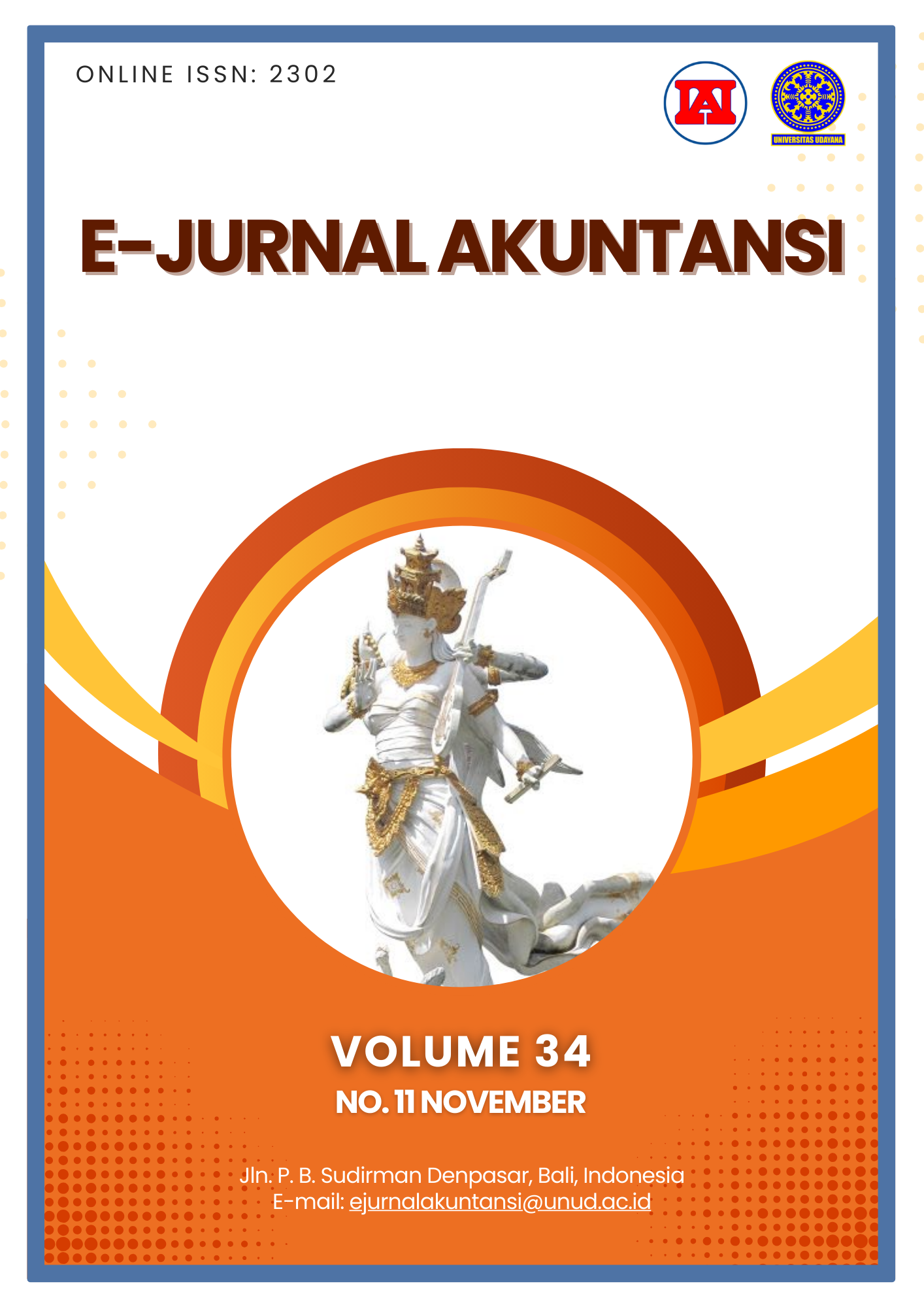The Rationality of Indigenous Accountability: Bali's Indigenous Village Accountability Practices
Abstract
Accountability, at its core, is the duty to report on and justify the fulfillment of responsibilities to the party that has entrusted those responsibilities. This study seeks to explore and conceptualize the rationale behind accountability in Traditional Village within Bali Province, grounded in the Tri Hita Karana philosophy. This article uses a literature review to explore the rationale behind accountability practices within the context of the local Balinese philosophy of Tri Hita Karana. By examining these two perspectives, it seeks to conceptualize a framework for accountability that is rational for the Balinese Traditional Village community organization. Based on the Tri Hita Karana philosophy, the rationale for accountability in Traditional Villages extends beyond formal financial reporting, encompassing spiritual and religious dimensions, regulatory and economic dimensions, and environmental considerations.
Downloads
References
Almquist, R., Grossi, G., Van Helden, G. J., & Reichard, C. (2013). Public sector governance and accountability. In Critical perspectives on Accounting (Vol. 24, Issues 7–8, pp. 479–487). Elsevier.
Bovens, M. (2007). Analysing and Assessing Accountability: A Conceptual Framework. European Law Journal, 13(4), 447–468. https://doi.org/10.1093/acprof:oso/9780199465330.003.0009
Busuioc, M., & Lodge, M. (2017). Reputation and accountability relationships: managing accountability expectations through reputation. Public Administration Review, 77, 91-100. https://doi.org/10.1111/PUAR.12612.
Chew, A., & Greer, S. (1997a). Contrasting world views on accounting: Accountability and Aboriginal culture. Accounting, Auditing & Accountability Journal, 10(3), 276–298.
Chew, A., & Greer, S. (1997b). Contrasting world views on accounting: Accountability and Aboriginal culture. Accounting, Auditing & Accountability Journal, 10(3), 276–298. https://doi.org/10.1108/09513579710178089
Degeling, P., Anderson, J., & Guthrie, J. (1996). Accounting for public accounts committees. Accounting, Auditing & Accountability Journal, 9(2), 30–49. https://doi.org/10.1108/09513579610116349
Degeling, P., Anderson, J., Guthrie, J., Degeling, P., & Anderson, J. (1996). Accounting for Public Accounts Committees. Accounting, Auditing & Accountability Journal, 9(2), 30–49.
Dicke, L. A., & Ott, J. S. (2002). A Test: Can Stewardship Theory Serve As A Second Conceptual Foundation For Accountability Methods In Contracted Human Services? International Journal of Public Administration, 25(4), 463–487. https://doi.org/10.1081/pad-120013252
Dillard, J., & Vinnari, E. (2019). Critical dialogical accountability: From accounting-based accountability to accountability-based accounting. Critical Perspectives on Accounting, 62, 16-38.
Gde, C., Putra, B., & Muliati, N. K. (2020). Spirit kearifan lokal bali dalam akuntabilitas desa adat. 11(3), 561–580.
Gelfand, M., Lim, B., & Raver, J. (2004). Culture and accountability in organizations: Variations in forms of social control across cultures. Human Resource Management Review, 14, 135-160. https://doi.org/10.1016/J.HRMR.2004.02.007.
Gray, A., & Jenkins, W. I. (1985). Administrative politics in British government. (No Title).
Gray, A., & Jenkins, W. I. (1986). Accountable management in British central government: some reflections on the financial management initiative. Financial Accountability & Management, 2(3), 171–186.
Gray, R., Bebbington, J., & Collison, D. (2006). NGOs, civil society and accountability: making the people accountable to capital. Accounting, Auditing & Accountability Journal, 19(3), 319–348.
Greiling, D., & Spraul, K. (2010). Accountability and the challenges of information disclosure. Public Administration Quarterly, 338–377.
Grossi, G., Kallio, K.-M., Sargiacomo, M., & Skoog, M. (2020). Accounting, performance management systems and accountability changes in knowledge-intensive public organizations: a literature review and research agenda. Accounting, Auditing & Accountability Journal, 33(1), 256–280.
Jacobs, K. (2000). Evaluating accountability: Finding a place for the Treaty of Waitangi in the New Zealand public sector. Accounting, Auditing & Accountability Journal, 13(3), 360–380. https://doi.org/10.1108/09513570010334919
Jang, Y. (2005). The Expansion of Modern Accounting as a Global and Institutional Practice. International Journal of Comparative Sociology, 46, 297 - 326. https://doi.org/10.1177/0020715205059569.
Jenkins, B., & Gray, A. (1993a). Codes of Accountability in the New Public Sector. Accounting, Auditing & Accountability Journal, 6(3), 52–67. https://doi.org/10.1108/09513579310042560
Jenkins, B., & Gray, A. (1993b). Codes of Accountability in the New Public Sector. Accounting, Auditing & Accountability Journal, 6(3), 52–67. https://doi.org/10.1108/09513579310042560
Keay, A. (2017). Stewardship theory: is board accountability necessary? International Journal of Law and Management, 59(6), 1292–1314. https://doi.org/10.1108/ijlma-11-2016-0118
Lindkvist, L., & Llewellyn, S. (2003). Accountability, responsibility and organization. Scandinavian Journal of Management, 19, 251-273. https://doi.org/10.1016/S0956-5221(02)00027-1.
Mir, F. A., Rezania, D., & Baker, R. (2020). Managing Change in Pluralistic Organizations: The Role of Normative Accountability Assumptions. Journal of Change Management, 20(2), 123–145. https://doi.org/10.1080/14697017.2020.1720776
Padet, I. W., & Krishna, I. B. W. (2020). Falsafah hidup dalam konsep kosmologi Tri Hita Karana. Genta Hredaya: Media Informasi Ilmiah Jurusan Brahma Widya STAHN Mpu Kuturan Singaraja, 2(2).
Peters, J. H., & Wardana, W. (2014). Discovering the Spirit of Bali. Customary Village as Icon of Tri Hita Karana. Udayana University Press, Denpasar.
Purnamawati, I. G. A. (2018). Dimensi Akuntabilitas dan Pengungkapan pada Tradisi Nampah Batu. Jurnal Akuntansi Multiparadigma, 9(2), 312–330.
Putra, C. G. B., & Muliati, N. K. (2020). Spirit kearifan lokal bali dalam akuntabilitas desa adat. Jurnal Akuntansi Multiparadigma, 11(3), 561–580.
Randa, F. (2011). 2011-Randa,Triyuwono,Ludigdo,Sukoharsono_Akuntabilitas Spiritual.pdf.
Riahi-Belkaoui, A. (1999). Earnings Measurement, Determination, Management, and Usefulness.
Romzek, B. S. (2000). Dynamics of public sector accountability in an era of reform. International Review of Administrative Sciences, 66(1), 21–44.
Romzek, B. S., & Dubnick, M. J. (2018). Accountability in the public sector: Lessons from the Challenger tragedy. In Democracy, bureaucracy, and the study of administration (pp. 182–204). Routledge.
Sirtha, I. N. (2008). Aspek Hukum Dalam Konflik Adat di Bali. Udayana Univeristy Press.
Surpha, I. W. (2004). Eksistensi Desa Adat dan Desa Dinas di Bali. (No Title).
Velayutham, S., & Perera, M. H. B. (2004). The influence of emotions and culture on accountability and governance. Corporate Governance: The International Journal of Business in Society, 4(1), 52–64.
Wirajaya, G. A., Sudarma, M., Ludigdo, U., & Djamhuri, A. (2014). The Accountability in the Dimension of TRI HITA Karana (THK). Scientific Research Journal, II(VIII), 10–17.
Zhong, L., & Fisher, K. R. (2017). Participation and Chinese non-government organization accountability. International Journal of Sociology and Social Policy, 37(13/14), 743–754.

This work is licensed under a Creative Commons Attribution-ShareAlike 4.0 International License.

















